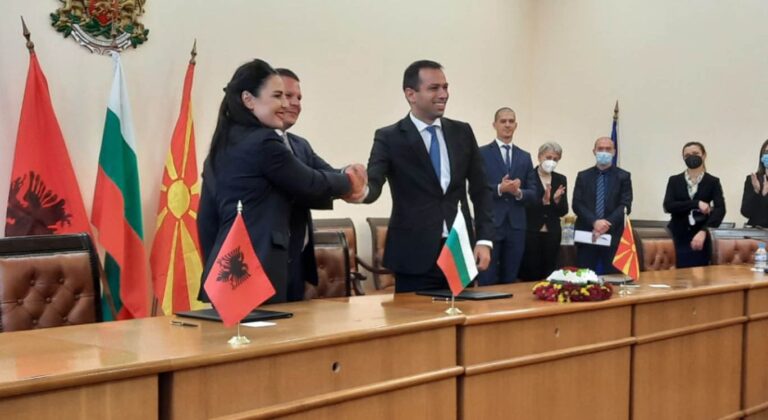The Ministers of Transport of North Macedonia, Bulgaria, and Albania, Blagoj Bochvarski, Hristo Aleksiev, and Belinda Balaku, today in Sofia, signed a Memorandum of Understanding for the construction of Corridor 8. The document sets clear dates for the development of the three countries and their activities on Corridor 8.
After the signing of the Memorandum, Minister Bochvarski said that Skopje is strongly committed to the construction of infrastructure projects and that in the six-year strategy of the Government, the country promised 2.7 billion euros in its development, MIA reports from Sofia.
Northern Macedonia plans to invest 200m euros in the first quarter of 2022 to build the Corridor 8 railway network to Bulgaria. The Government of Northern Macedonia has provided funds for the first two sections, and it remains to be provided for the third from Kriva Palanka to Deve Baer, which will cost 400 million euros. 90 million euros have been provided for the construction of the expressway from Kumanovo to Deve Bair in the direction of Bulgaria. Bochvarski predicts that the entire route of Corridor 8 on the territory of Northern Macedonia will be built by 2030, and probably earlier. There is a project ready for the railway part from Kicevo to the border with Albania, but opportunities are being sought to find funds. The leg of Northern Macedonia to Albania is 70 km.
Bulgarian Transport Minister Aleksiev also predicts that Corridor 8 will be ready by 2030. He announced that Bulgaria next week will start the tender for construction of the railway section between Pernik and Radomir, and in 2022 the other section from Radomir to Gjueshevo, for which there is already a technical project. According to initial estimates, this part will cost 200m euros. Bulgaria is working together with Northern Macedonia on the border tunnel.
Albania, as Minister of Transport and Energy Balaku said, is working hard on the construction of a road to the border with Northern Macedonia, as well as a special port for Corridor 8.
The three ministers, of Bulgaria, Northern Macedonia and Albania, agreed that Corridor 8 is of strategic importance not only for their economies, but also for better connectivity of the Balkans with Western Europe, the Black Sea and other European partners.

